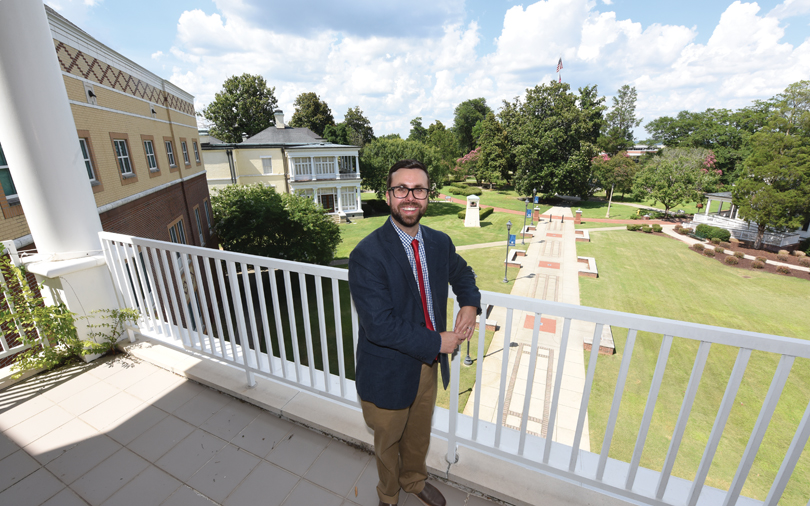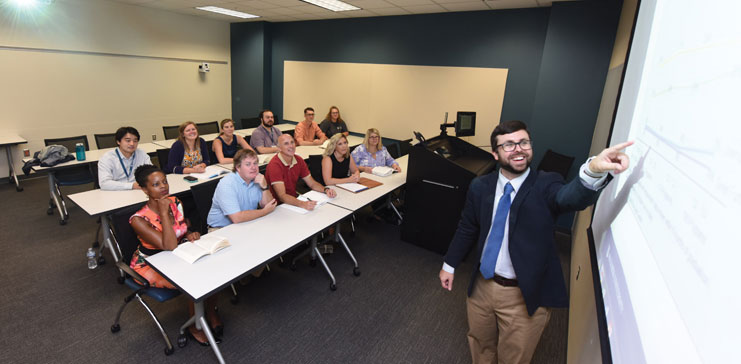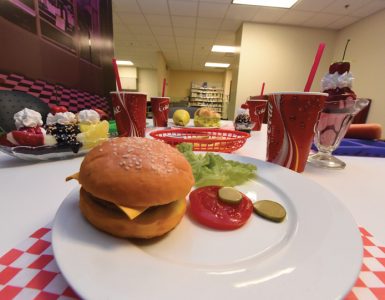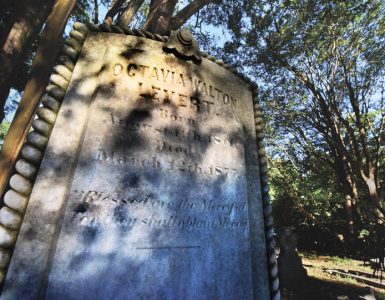Master of Public Administration program graduates shape the places we live
Twenty years ago, a right turn at Interstate 20’s Exit 190 would have landed you in the middle of a pine forest. A right turn at the same exit today puts you in the middle of a construction zone. The little stretch of pavement along Horizon South Parkway, which bleeds into Lewiston Road as it approaches town, has witnessed unprecedented growth in the past couple of years. Once home to a lonely Waffle House and a truck stop gas station, the exit now boasts a Kroger, a Walmart, an Aldi, a hotel, an apartment complex and a primary care facility, all within walking distance.
Sometimes it feels as if the buildings in Grovetown, Georgia, spring up from the earth, prebuilt, pre-furnished and ready for business, but the explosion isn’t all flash and fizzle. That kind of growth brings big challenges. One of the largest, according to Grovetown City Administrator John Waller (MPA ’13), is a surge in traffic.
“One of the biggest problems we have now is making a left turn,” he said.
If anyone can make sense of Grovetown’s rapid growth, it’s Waller. A retired Army colonel, he took a job with the city in April of 2016 as a code enforcement officer. Within 90 days, the city’s director of planning and development quit, and the mayor and City Council offered Waller the position as an interim. Less than a year later, the city made a decision to change things up at the administrator level. Waller applied, and the rest is history.
Being thrust into a position of authority so quickly after starting a new a career might have intimidated some, but after 27 years in the Army, the rapid pace seemed like business as usual to the father of two. Even at its most stressful, Waller said the work feels like a breeze compared to a combat tour — a fact he’s quick to point out to his staff.
“I tell people all the time, it’s about perspective,” he said. “Since I’ve started, I’ve never had a meeting interrupted by a rocket attack. I’ve never had an [improvised explosive device] go off on my way home from work. I’ve never gotten a call at 3 a.m. telling me one of my convoys has been blown up.”
Even so, Waller has his hands full. Just as he was in the right place at the right time in April 2016, his city is now poised to take a transformational leap forward. Located less than 20 miles from the newly opened Georgia Cyber Center in downtown Augusta and just down the road from a proposed new entrance to the sprawling Fort Gordon, Grovetown is uniquely positioned to woo military tech contractors out of the city and into the suburbs. That opportunity comes with challenges of its own, however.
“We had to ask ourselves, ‘Do we want to stay the size we are now, or do we want to plan ahead and get ready for the growth opportunities coming our way?’” Waller said.
The city settled on the latter, but the decision to annex land for new development was not unanimously loved by Grovetown’s residents. Some worried the little city, billing itself as “A Community that Cares,” would soon outgrow them, focusing instead on creating new prospects to draw in a younger, more tech-focused demographic. Faced with that kind of pushback, Waller did the only thing a city administrator can do when staring down two opposing viewpoints. He helped city officials make the most informed decision possible.
“There’s no right answer,” he said. “I and the staff and the mayor and the City Council need to consider the point of view of lifelong residents while also considering the wants and needs of the younger, more tech-savvy generation.”
Waller’s point underscores a common misconception about the work city administrators do. While they do make high-level decisions on some issues, administrators spend just as much time working as a sort of “city initiatives” salesperson, gathering information, packaging it and then presenting it to elected officials in the form of actionable solutions. No choice is the “right” one. No choice ever will be. But some solutions are more right than others, and it’s an administrator’s job to make sure those choices get the attention they deserve from elected decision-makers. For Waller, that means convincing four council members and a mayor that a solution not only has merit, but is in the best interests of the citizenry.
“It’s definitely a challenge,” Waller said. “I essentially have five bosses, and none of them agree 100 percent on anything.”
Balancing that many expectations is a monumental task, but it’s nothing Waller can’t handle. Long before he got his foot in the door at Grovetown with the aid of Augusta University’s Master of Public Administration (MPA) program, he faced a very different kind of challenge.
Waller never intended to stay in the Army. When he first joined, the work was just that: A way to earn a stable income and support a young, growing family. That changed the first time he jumped out of an airplane. What began as chasing a dollar quickly morphed into chasing a career; however, the landings weren’t always smooth.
“I loved it,” Waller said, “but I must not have been very good at it because I broke my back on my 13th jump … and again in Ranger school.”
Over time, that damage took its toll.
“I was popping pain pills like candy,” Waller said. “The pain was so bad, I couldn’t sit up; I couldn’t lay down. That doesn’t leave a lot of options.”
Hoping to continue his service in the military, Waller relocated to Augusta with his family to join the Fort Gordon Warrior Transition Battalion — a unit for soldiers looking to return to active duty or re-enter civilian life after illness or injury. Army doctors had other plans, though, and Waller ended up retiring.
After pursuing a clinical trial for pain management, he enrolled in the MPA program, and another challenge began.
Walking to class with a cane was a sharp change of pace. When the pain in his back was too great to sit, Waller stood. He jokes that some of his courses were a blur — he was still on heavy pain medication at the time — but even when things were at their toughest, he refused to give in. Meanwhile, the faculty of the MPA program helped keep him moving.
“I wanted to take a course that wasn’t offered, and Dr. Saundra Ribando [professor of political science] set up an independent study for me,” Waller said. “There was a lot of that. If there was something [MPA faculty] could make happen, they would do it. They were very accommodating.”
With his military background and the aid of the MPA program, Waller soon transitioned from army colonel to nonprofit consultant and later to city administrator. Shortly thereafter, the MPA program underwent a transition of its own.
From spring 2016 to fall 2017, the program more than doubled its size. Once a small and intimate branch program, the MPA now boasts more than 60 students at any given time. The wild success of the university’s MPA program hasn’t only benefited students, however.
“The growth has been exciting,” said William Hatcher, director of the Master of Public Administration program in the Katherine Reese Pamplin College of Arts, Humanities, and Social Sciences. “It obviously benefits the university, but it also benefits the community by ensuring we have public administrators trained by nationally recognized faculty.”
While the growth can sometimes make accommodating students’ needs more difficult, the MPA’s guiding principle remains the same: Give students the best education possible on a schedule that works for them.
“The program is designed to educate full-time professionals working in public service,” Hatcher said. “To be able to accomplish that, we have to be as flexible as possible.”
A major point of pride for the program is the number of local students enrolling. Augusta has more charities and nonprofits per capita than almost any other city in the United States. Combine that with the growth in the city’s suburbs, and the need for highly trained organizational leaders becomes immediately clear. Being native to a region isn’t necessarily a requirement for doing a great job as a public administrator. But it does make a difference.
“Having more public servants from the Augusta Metro trained in our program builds the governing capacity of our public agencies and nonprofits,” Hatcher said. “Simply put, having more graduates not only betters the future careers of our students, but also the lives of the citizens in our communities.”
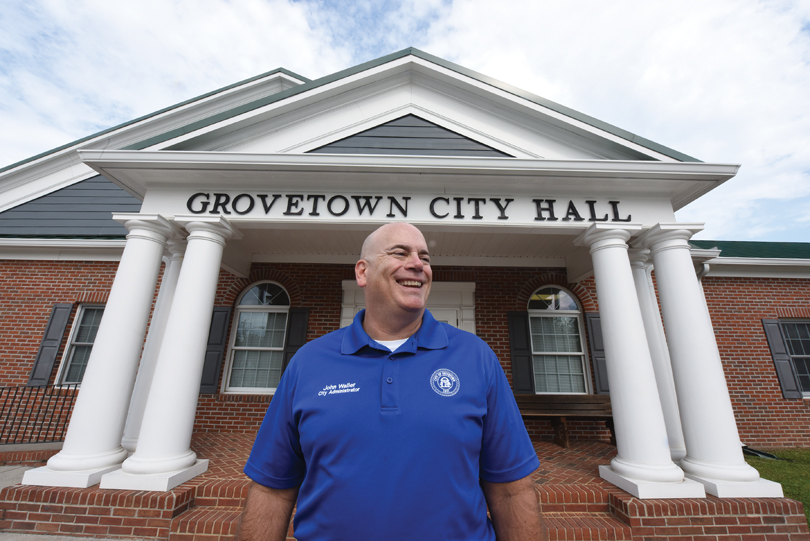
Across the Savannah River, one alumnus understands that concept better than most. Todd Glover (MPA ’98) is the city administrator for North Augusta, South Carolina. He’s also a graduate of the university’s first MPA cohort, a holdover from the days when Georgia Southern University’s branch program used to meet on the Summerville Campus.
Before entering the field of public administration, Glover had planned to go to law school. Dedicated to the ideals of working with and around the law and law enforcement, he might have carried on down that path if not for a chance occurrence — a lawsuit filed against the department he was interning with at the Lower Savannah Council of Governments. The lawsuit offered Glover a rare opportunity: A chance to second guess his plans for the future.
“I got to be up close and personal with that lawsuit, and I really began thinking, ‘Is this really what I want to do?’” he said.
Another chance occurrence gave him his answer. While making copies one morning, he spied a flyer on the wall for an MPA program at Augusta University. The rest is history.
No stranger to growth, Glover recently helped his city navigate a multimillion-dollar construction project. Known locally as Project Jackson, the project included the construction of a new baseball stadium — SRP Park — as an anchor for new restaurants, new housing and some much-needed office space. The construction seemed like an all-around victory. As the Georgia Cyber Center rose on one side of the river, a slew of buildings went up on the other, adding a new sense of vibrancy to an area many local residents saw as an idyllic, “old-school” community. But as was the case in Grovetown, not all of North Augusta’s residents were pleased with the change. For a second time in his life, Glover found himself at a crossroads because of a lawsuit.
“We were sued. We went, I believe it was 20 months, through the courts,” he said. “There was opposition to it.”
That opposition came in various forms, from complaints over noise pollution to worries about wildlife preservation. Other residents raised concerns over the city’s plan to pay for the structure. Aided by social media, opposition to Project Jackson spread like wildfire.
Like Waller in Grovetown, Glover worked tirelessly to find the best possible solution for residents of North Augusta. Meeting with opposition leaders, he strove to find common ground through compromise. The apartments shadowing left field at SRP Park are a clear example of that; their placement is a direct response to concerns from nearby residents over noise pollution. As complaints and worries continued to roll in, however, Glover realized he’d have to do more than simply reassure the public. He’d have to give them a show of faith.
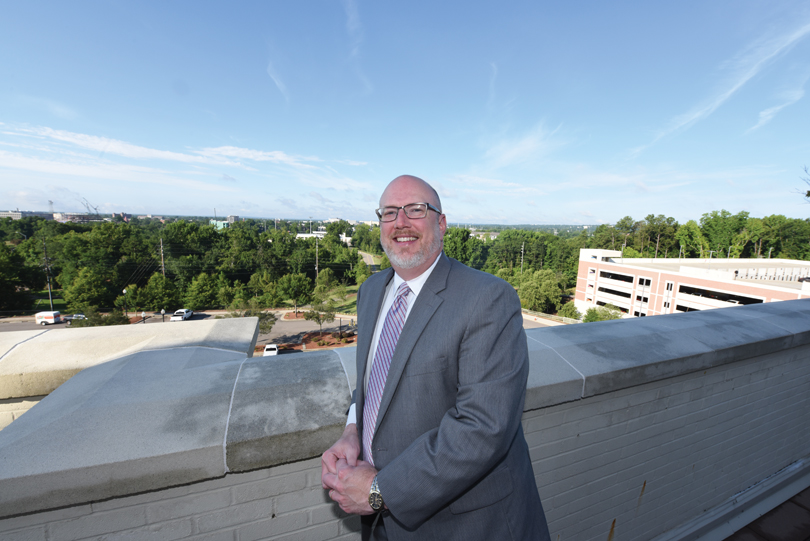
“I needed to have some skin in the game,” he said.
In response, he and his wife built a new home in Hammond’s Ferry — a 10-minute walk from the stadium.
Coming from anyone else, the gesture might have come across as pandering. But for Glover, a lifelong resident of Aiken County, moving into the “fray” was just another commitment to doing right by his neighbors. In that way, he’s unique in the field of public administration. City administrators typically move every couple of years as new challenges come and go. Glover, who’s worked for four separate government entities, has never left the region. That hometown loyalty served him well during the years long slog to get Project Jackson up and running. Now, he’s hoping it’ll help him with his next mission: bringing cyberprofessionals across the Savannah river.
The stage is already well set. Adding a major sporting venue to the area, combined with the new restaurants and new shops to follow, means North Augusta will have a leg up when it comes to attracting millennial professionals to the region.
“How do you convince a young professional who’s living in an Austin, Texas, or a Washington, D.C., or New York City or even Charlotte to move to Augusta?” Glover asked. “A project like ours provides some of those cool amenities they’re used to having in more urban environments.”
Those amenities may be needed now more than ever. A recent cyber workforce study published by Hatcher and colleagues Dr. Wesley Meares, assistant professor of political science, and Dr. Mark Harris, assistant professor of cyber sciences, shows those young professionals are already coming to the area. In droves, in fact. From 2016 to 2017 alone, the cyber workforce grew by more than 15 percent. The boom isn’t just coming; it’s already here. Now, Glover said he and city officials needs to be prepared for it.
“I think cyber could be as big for our side of the river as Savannah River Site building up in the 1950s,” he said. “You see what the state of Georgia’s doing on the other side of the river with the Cyber Center. I think it’s a tremendous opportunity for us.”
As more and more young professionals flock to the region in search of cyber-related jobs, the growth in and around Augusta isn’t likely to slow down anytime soon. The city and its neighboring suburbs are in for many years of change, and while sometimes frustrating, the accompanying growing pains are a sign of opportunity to come. Though they live at the epicenter of change, the residents of Grovetown and North Augusta can rest easy. There’s an art to growing. Waller, Glover, and the program that shaped them know it well.
